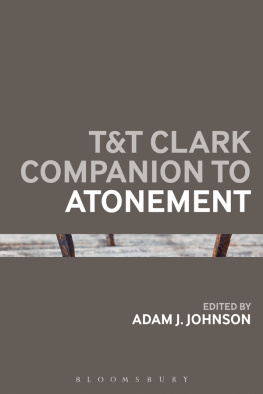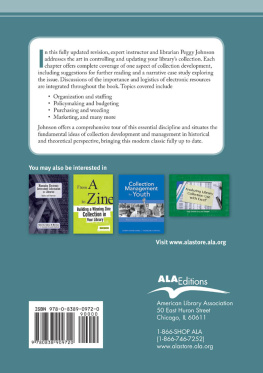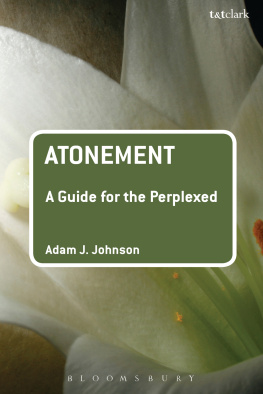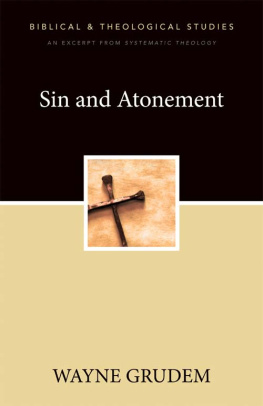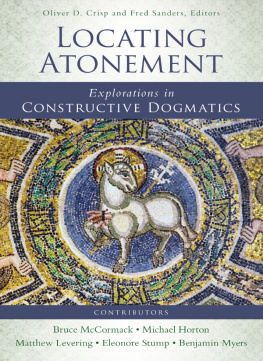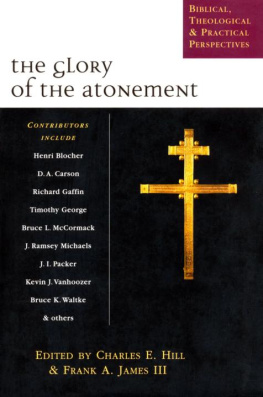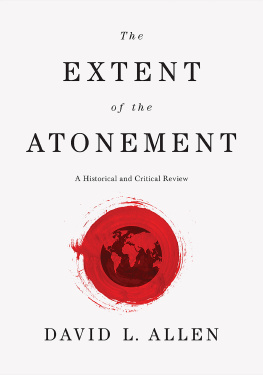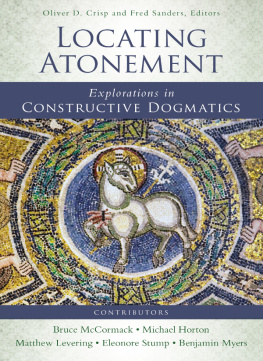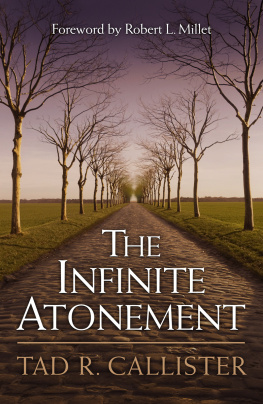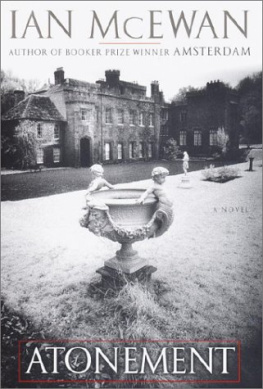Johnson - T & T Clark Companion to Atonement.
Here you can read online Johnson - T & T Clark Companion to Atonement. full text of the book (entire story) in english for free. Download pdf and epub, get meaning, cover and reviews about this ebook. City: London, year: 2017, publisher: Bloomsbury Publishing PLC, genre: Religion. Description of the work, (preface) as well as reviews are available. Best literature library LitArk.com created for fans of good reading and offers a wide selection of genres:
Romance novel
Science fiction
Adventure
Detective
Science
History
Home and family
Prose
Art
Politics
Computer
Non-fiction
Religion
Business
Children
Humor
Choose a favorite category and find really read worthwhile books. Enjoy immersion in the world of imagination, feel the emotions of the characters or learn something new for yourself, make an fascinating discovery.
T & T Clark Companion to Atonement.: summary, description and annotation
We offer to read an annotation, description, summary or preface (depends on what the author of the book "T & T Clark Companion to Atonement." wrote himself). If you haven't found the necessary information about the book — write in the comments, we will try to find it.
T & T Clark Companion to Atonement. — read online for free the complete book (whole text) full work
Below is the text of the book, divided by pages. System saving the place of the last page read, allows you to conveniently read the book "T & T Clark Companion to Atonement." online for free, without having to search again every time where you left off. Put a bookmark, and you can go to the page where you finished reading at any time.
Font size:
Interval:
Bookmark:

T&T Clark Companion to Atonement
We dedicate this book to the contributors of this volume who went to be with the Lord prior to its completion. While more qualified than ever as saints and theologians, they lack (for the time being) the ability to share with us the fruits of their vision.
Ralph Del Colle
I. Howard Marshall
Edward T. Oakes
John Webster
Forthcoming titles in this series include:
T&T Clark Companion to Christian Prayer, edited by Ashley Cocksworth and John C. McDowell
T&T Clark Companion to Colin Gunton, edited by Myk Habets and Andrew Picard
T&T Clark Companion to de Lubac, edited by Jordan Hillebert
T&T Clark Companion to Pneumatology, edited by Daniel Castelo and Kenneth M. Loyer
T&T Clark Companion to Political Theology, edited by Ruben Rosario Rodriguez
T&T Clark Companion to Schillebeeckx, edited by Stephan van Erp
T&T Clark Companion to Thomas. F. Torrance, edited by Paul D. Molnar and Myk Habets
T&T Clark Companion to the Theology of Kierkegaard, edited by David J. Gouwens and Aaron Edwards
Titles already published include:
T&T Clark Companion to Atonement, edited by Adam J. Johnson
T&T Clark Companion to Augustine and Modern Theology, edited by C.C. Pecknold and Tarmo Toom
T&T Clark Companion to the Doctrine of Sin, edited by Keith L. Johnson and David Lauber
T&T Clark Companion Liturgy, edited by Alcuin Reid
T&T Clark Companion to Methodism, edited by Charles Yrigoyen Jr
T&T Clark Companion to Nonconformity, edited by Robert Pope
T&T Clark Companion to Reformation Theology, edited by David M, Whitford
T&T Clark Companion to the Septuagint, edited by James K. Aitken
T&T Clark Companion to Atonement
Edited by
Adam J. Johnson
Bloomsbury T&T Clark
An imprint of Bloomsbury Publishing Plc

Contents
This Companion seeks to contribute to the renewal and development of the doctrine of the atonement. Negatively, it seeks to move beyond commonly held assumptions about the mutually exclusive nature of theories of the atonement and simplistic views of the history of the doctrine (in which there were three main types of theories throughout the history of the church). Positively, it seeks to offer an expansive view of the doctrine, rooted in and contributing to further developments in doctrinal, biblical, and historical studies. If there is an emphasis within the volume, it lies in paying particular attention to the doctrinal intersections so vital to a full understanding of the atonement.
Given this aim, the various chapters seek to model future work on the doctrine, equipping the reader for this work. While the various authors do not all agree, and their positions will at times be at odds, the underlying vision for a more biblically, historically, and theologically expansive understanding of the work of Christ is largely shared, as is the desire to provide the reader with those resources necessary for this task. For this reason, the contributors have been asked to equip, more than summarize. Space constraints and the scope of the vision make it nearly impossible for any of the following essays to offer a complete overview of their respective topics.
Likewise, space constraints prohibit the inclusion of a wide variety of topics and figures relevant to the atonement. The goal is to provide an example through the selection of key topics and figures, giving the reader those concepts, definitions, context, and sources (primary or secondary) which will be most helpful in contributing to further research, either in the topics covered in this book, or others which by necessity or oversight have been omitted.
In short, the contributors to this volume hope that this book will furnish the church with the tools and example it needs to join us in this ongoing task. While there is a time and place for definitive and binding statements, comprehensive summaries, and decisive conclusions, this book aims rather to reinvigorate and redirect studies within this doctrine, for the sake of its growth and development in the years to come.
So many of the mystic theologians (such as Julian of Norwich and John of the Cross), poets (particularly those of the Anglican tradition, such as Herbert and Donne), post-Reformation Lutherans and Catholics, non-Western Christian traditions (Arab Christians such as Theodore Abl Qurrah, or Indian Christians), biblical scholars of the past few centuries ... the list of omissions is vast as to be discouraging.
Acknowledging those who played a formative role in the making of this volume would include the reduplication of the list of contributorsfor the contributors of this volume have been a constant source of assistance for which I am very grateful. My goal in editing this volume was to have such a resource on my shelf, and I am exceptionally thankful for the work the contributors have done to make this possible.
A handful of friends and colleagues lent a particularly helpful hand, making key recommendations for entries and contributors, without which the volume would have been significantly impoverished. Among these are Michael Allen, Scott Harrower, Matt Jenson, Ryan Peterson, Ben Rhodes, Fred Sanders, and Ben Sutton.
This volume in particular calls for the acknowledgment of Thomas Kraft and Anna Turton, who trusted me with this project. I never would have pursued such a daunting task without their trust and wisdom. I remember with great fondness my conversation with Thomas in a Starbucks in San Francisco as we first discussed this project. As I walked away from that meeting, I felt as though the keys to the kingdom had been handed to me, laughing out loud as I sauntered down the streetwhat better place for such behavior than San Francisco?
Biola University and the Torrey Honors Institute have helped me greatly to bring this project to completion through course releases and, above all, their support of my research assistant, Rachael Smith, who is as efficient as a small and well-trained army of editors. Additional thanks go to Daniel Chrosniak, Garrett Eaglin, Hannah Grady and Micah Hogan, who stepped in at the eleventh hour to help complete the biblical index.
As with all my work, I did not do this alone: my time is my familys time, and my labor is theirs. I thank my wife, Katrina, and our sons, Reuben, Nathan, and Simeon, for the opportunity and motivation to work on this book.
Adam J. Johnson
The doctrine of the atonement is the churchs act of worship, an act of faith seeking to understand and expound the manifold ways in which the whole life, death and resurrection of Jesus Christ, the incarnate Son of God and Messiah of Israel, was the chosen and effective means of the triune God to bring about the reconciliation and fulfillment of all things which God had made (in heaven, earth and below the earth) through a restored relation to himself, veiled now and made fully manifest in the Eschaton.
The goal of this doctrine is to understand and expound: the sanctified intellects joyful act of worship,, of learning, recognizing, and understanding the witness we have received, for its origin lies in the decision and act of God, who does not merely seek to save his creatures, but to be known and worshipped by them as he is, as the Savior.
Only in a secondary and derivative way does the doctrine of the atonement dwell upon and respond to the challenges and heresies of its day. Biblical, theological, philosophical, religious, ethical, and other critiques have their vital role to play in the development and formation of doctrine (not least in holding it accountable to its true vocation). But as the churchs calling and freedom to develop doctrine stems from the being and act of God, such critiques and questions play at most a significant ministerial role in holding the church accountable to its primary calling: joyful and rigorous reflection upon and development of the scriptural testimony to the saving work of the Lord Jesus. This is all the more true, given that the churchs primary end endures beyond all conflict and error, joining the angels in their never-ending privilege of worship, singing blessed is the lamb who was slain (Rev. 5:12) in ever new stanzas and choruses (Ps. 96:1).
Font size:
Interval:
Bookmark:
Similar books «T & T Clark Companion to Atonement.»
Look at similar books to T & T Clark Companion to Atonement.. We have selected literature similar in name and meaning in the hope of providing readers with more options to find new, interesting, not yet read works.
Discussion, reviews of the book T & T Clark Companion to Atonement. and just readers' own opinions. Leave your comments, write what you think about the work, its meaning or the main characters. Specify what exactly you liked and what you didn't like, and why you think so.

